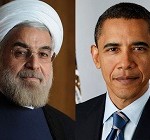Washington: The peace overtures by President Barack Obama and Iran’s Hassan Rouhani after decades of unbridled hostility are brave moves but the window of opportunity is narrow and ready to be slammed shut by hawks on both sides.
Obama, whose instincts for peace are rising once again to the fore as exemplified with a diplomatic deal on Syria, has a tough crowd to pacify at home. The anti-Iran critics, who generally overlap with the pro-Israel crowd, see no reason for Obama to trust Rouhani’s promises on Iran’s nuclear program.
Rouhani has an equally difficult set of power players in Teheran to convince that it is worth trying serious negotiations with the “Great Satan” once again to ease the sanctions, which have desperately begun to hurt. He has the mandate of the people and the support of the supreme leader, Ayatollah Ali Khamenei.
Rouhani has said he anticipates an agreement on the nuclear issue within three months or six but not years.
While Iran’s immediate compulsions may be narrower in seeking a breakthrough, Obama may have a bigger game in mind. A friendly Iran means better prospects for peace in Syria, a safer Israel, a better balance in West Asia between Sunnis and Shias and an alternate avenue to Afghanistan, which would reduce the U.S. dependence on Pakistan. Every which you look, it seems for the good.
If all goes well and meaningful negotiations begin, India stands to benefit. Oil prices should climb down helping ease the pressure on foreign exchange reserves. As U.S. sanctions dissipate, India could once again start buying Iranian crude. The rupee could rise a little more.
And finally, if India is ambitious, it could be a creative player in peace making and use its contacts in Teheran to nudge the process forward. Washington would appreciate imaginative interventions by New Delhi.
There are a lot of “ifs” and things can fall apart. The centre may not hold because Washington hawks are a ferocious breed. Still, this time it appears that more ducks are in a row.
The build-up has been solid. First the secret letter exchanges between Obama and Rouhani, the cute Twitter messages by @HassanRouhani wishing Jews a happy Rosh Hashanah, then the diplomatic choreography at the UN, Rouhani bringing the only Jewish MP along to New York and the careful media interactions.
The cast of characters also inspires confidence. Obama is not George W. Bush who listed Iran in the “Axis of Evil,” shortly after Iran helped the U.S. oust the Taliban from power in Afghanistan in 2001. The strange payback for cooperation scotched any progress and it has been downhill since. Former Iranian president Mahmoud Ahmadinejad missed no opportunity to inject poison into the debate with his denial of the Holocaust and vows to wipe Israel off the face of the earth.
Incidentally, along with Rouhani, a key player in the new effort at rapprochement is Javed Zarif, Iran’s new foreign minister. The duo had led that last initiative at peacemaking post the Taliban ouster only to be spurned by the Bush Administration. Rouhani then tried reaching out to the Europeans about Iran’s nuclear program with an offer of a cap but was rebuffed.
While the Iranian team is the same today, it is Obama’s receptivity that could mean the difference between success and failure. And thereby hangs a ray of hope.
Obama made several gestures in his UN speech on Tuesday, including publicly acknowledging U.S. meddling to topple a democratically elected government in Iran in 1953 which helped install the Shah regime, which in turn led to the Islamic Revolution.
The acknowledgement was a smart move by Obama with little political cost since documents related to the CIA’s role have been declassified. In Iran, his admission will go some distance to help assuage feelings of injustice. He also assured the Iranians he was not seeking regime change.
“We should be able to achieve a resolution that respects the rights of the Iranian people while giving the world confidence that the Iranian program is peaceful,” Obama said. Iran would have to take “transparent and verifiable” steps. He then assigned Secretary of State John Kerry to head the nuclear negotiations with Iran, streamlining the process which has meandered among various officials.
Rouhani, on his part, assured the UN General Assembly – minus the Israeli delegation which walked out in protest – that his government was prepared to “remove any and all reasonable concerns” while asserting that nuclear weapons are not a part of Iran’s security strategy.
The opening to Iran would be significant for Obama’s other peace effort – to remove Syria’s chemical weapons. Iran supports Bashar al-Assad’s regime but has strong reservations about the use of chemical weapons having been a victim itself.
But to pull off this big opening, Obama can’t do the old American dance and demand complete capitulation from Rouhani. Both sides will have to compromise and Iran’s legitimate needs will have to be accommodated. Rouhani has signalled his willingness to compromise – he said Iran would never deploy nuclear weapons and he has also backed the Syria initiative.
Can Obama go beyond the old template and convince the U.S. Congress and Israel that concessions to Iran are worthwhile in exchange for stringent inspections and gradual lifting of sanctions? What is clear is that only a real offer can take the process forward.
Some have proposed allowing Iran to enrich uranium up to 5%. Now that would set the ball rolling.
Seema Sirohi is a Washington-based analyst and a frequent contributor to Gateway House: Indian Council on Global Relations. Seema is also on Twitter, and her handle is @seemasirohi
This article was exclusively written for Gateway House: Indian Council on Global Relations. You can read more exclusive content here.
For interview requests with the author, or for permission to republish, please contact outreach@gatewayhouse.in.
© Copyright 2013 Gateway House: Indian Council on Global Relations. All rights reserved. Any unauthorized copying or reproduction is strictly prohibited.


